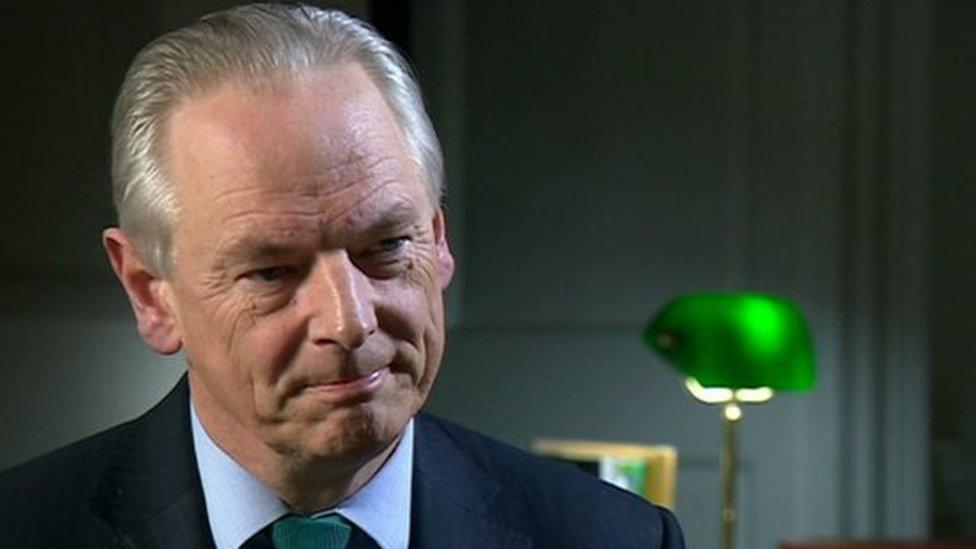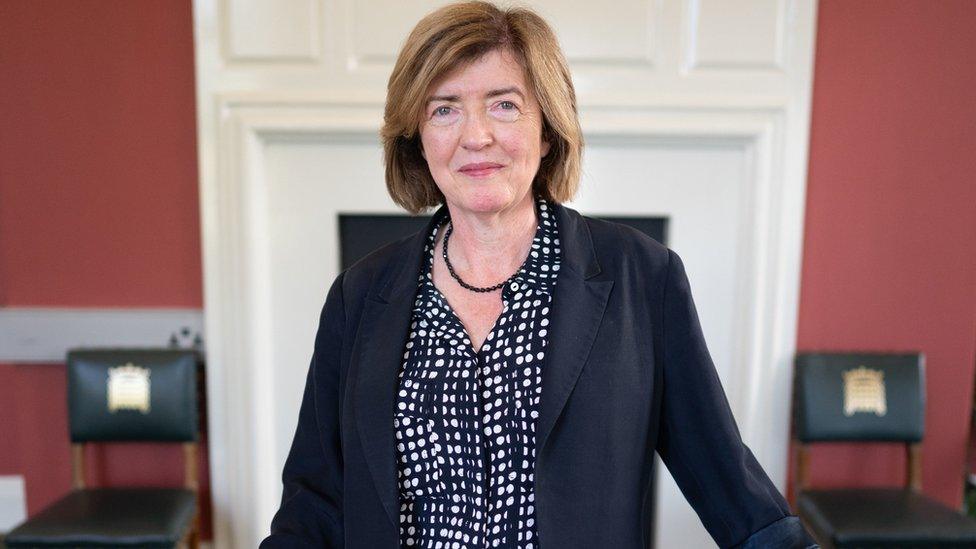Tory civil service reformer Lord Maude open to Labour talks
- Published

Lord Maude said he understood why the government might be resistant to his "controversial" reforms
A former Tory minister who has reviewed the civil service for the government has suggested he would talk to Labour about his ideas for reform.
Lord Maude was asked to look at how the civil service works and recommend ways to make government more efficient.
His review will propose scrapping the post of the UK's top civil servant and breaking up the Treasury.
He has submitted the results to Rishi Sunak's government and it was widely expected to be published this year.
Lord Maude previewed some of his recommendations at an event organised by the think tank Reform in Westminster on Wednesday.
The former Cabinet Office minister said he recognised why the government might be resistant to some of his more "controversial" ideas, but insisted the changes would "strengthen" the civil service.
With a general election expected next year, the government would have limited time to make some of the bigger changes recommended by Lord Maude.
When asked if he thought the government would implement his review, Lord Maude told the Reform event: "I have absolutely no idea."
As a follow-up question, he was asked if he was talking to Labour about his findings, to which he replied: "At the appropriate time."
His review was commissioned by Boris Johnson in 2022 - but the peer said it was "addressed to all who have an interest in the governance of the country".
The BBC has been told Lord Maude has briefed senior Labour figures on his ideas for shaking up the civil service machine.
A Labour source said the party had not seen a copy of the review - and was waiting to study its contents, and the government's response to them, before making any decisions on civil service reform.
Former colleagues
Lord Maude was minister for civil service reform in David Cameron's government - but some of his more radical ideas upset senior officials.
At the Reform event, Lord Maude made a point of praising former senior civil servant Sue Gray, with whom he worked at the Cabinet Office in the early years of the coalition government.

Sue Gray took over as the Labour leader's chief of staff earlier this year
Known for her internal investigation into the Partygate scandal, Ms Gray is now chief of staff to Labour leader Sir Keir Starmer.
Key to her role is preparing Labour for government and working out how best to ensure Whitehall can deliver Sir Keir's priorities.
Sir Keir wants the civil service to deliver what he has described as his "missions" in government - and to be able to get on with them immediately after winning a general election.
Ms Gray's expertise in how the civil service works is seen as crucial in giving Labour the best possible chance to do that.
At the time of her appointment by Labour, Lord Maude defended the "integrity" of Ms Gray and praised her "experience and undoubted abilities".
In a letter to the Times, external, Lord Maude wrote: "We should be as relaxed about this as we should be about people who have had previous political involvement coming into the civil service."
He echoed those comments at the Reform event, calling Ms Gray "a brilliant and impeccably impartial civil servant".
"There's absolutely no reason why people with a political background shouldn't become civil servants," Lord Maude said.
The recommendations in his review of the civil service were first reported by the Times, external last week.
At the Reform event, Lord Maude said the role of cabinet secretary - who leads the civil service and is the prime minister's most senior policy adviser - should be split into two new jobs.
He said one job would be to advise the prime minister and run his office at the centre of government, while the other would be to lead the civil service.
Lord Maude said he wanted the new head of the civil service to run a separate "budget ministry". The new ministry would be in charge of allocating money to government departments, but the Treasury would retain control of tax and economic policy.
Lord Maude will also suggested giving ministers more of a say in the appointment of civil servants, and introducing "360 reviews" to assess their performance.
Related topics
- Published17 October 2023

- Published31 May 2024

- Published7 August 2023
